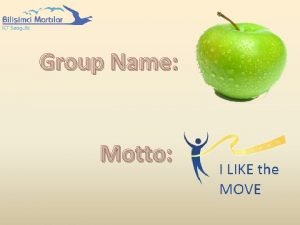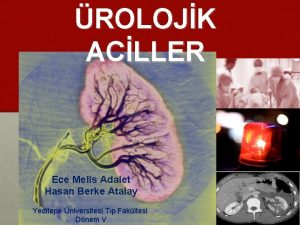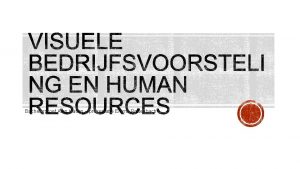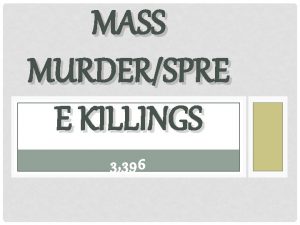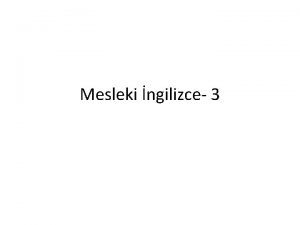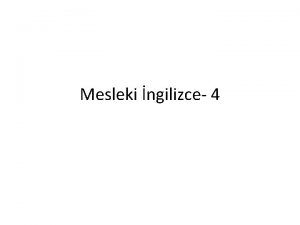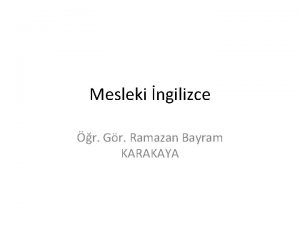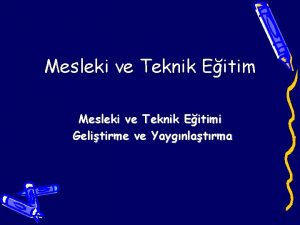Mesleki ngilizce Dr r yesi Hasan Tahsin SELUK




















- Slides: 20

Mesleki İngilizce Dr. Öğr. Üyesi Hasan Tahsin SELÇUK 2020


• Parts of a House 1. Chimney: If you have a fireplace, you probably also have a _____ so that the smoke can escape from your house. • 2. Heater: What machine or system is used to warm up your house in the winter? • 3. Air conditione: How about to cool down your house in the summer? • 4. Ceiling fan: This device used to cool down a room is typically found on ceilings. • 5. Fire escape: If you live an apartment, you might find this set of ladders and platforms on the exterior of your building for emergencies. • 6. Elevator: If you live an apartment, you might also use this to reach high floors instead of the stairs. • 7. Den: This is a term for a small, comfortable room where you can do activities like read or watch TV in private. • 8. Mudroom: This is a small room or entryway where you can remove your shoes before entering the house.

• 9. Powder room: What do you call a bathroom without a bathtub or shower? • 10. Basement: What do you call the underground level of a house? • 11. Attic: How about the highest level of a house, which is usually used for storage? • 12. Vestibule / foyer: This is an antechamber, hall, or lobby you can enter before getting to the actual entrance of some houses. • 13. Radiator: This a type of heater consisting of a tank and metal pipes located at the side of a room. • 14. Roof: What do you call the outer layer found on the very top of a house? • 15. Roof tiles: How about the individual pieces used to make the roof? • 16. House plant: This is a general name for a plant found indoors. • 17. Hallway: If you live in an apartment or a dormitory, you’ll have to pass through this corridor before you reach your front door. • 18. Buzzer: People will need to ring this if they want to contact someone in an apartment. • 19. Poster: You might have a _____ of your favorite band or artist posted on your wall, especially if you live in a dorm.

• Rooms inside the House 1. Bedroom 2. Living room 3. Dinning room 4. Kitchen 5. Bathroom

• Areas of a House • 1. Front door: What will visitors usually knock on when they visit your home? • 2. Doorbell: Or they can ring this instead. • 3. Welcome mat: This is a sort of small rug that you can put in front of your door for visitors to step on. • 4. Porch: This is an open area in front of the entrance to some houses that’s covered by a roof and might contain some columns. • 5. Porchlight: If it’s dark outside and you want to hang out on the porch, what should you turn on? • 6. Mailbox: What should you open to check your mail? • 7. Lock: You might want to make sure this is secure if you don’t want anyone invading your home. • 8. Curb: This is a part of the street between the actual road and the sidewalk where grass grows.

• • • • • • Garden Vocabulary List: 1. Fence : This is a barrier that guards the perimeter of your home. 2. Gate: You can get past a fence through an entrance called a _____. 3. Lawn : This is what you call a long stretch of grass, either in front of or behind your house. 4. Lawnmower : If the grass in your backyard is getting a bit long, you might want to pull out your _____. 5. Garden : Many people like to grow flowers, fruits, and vegetables in a _____ in their backyard. 6. Vegetable patch : This is a small garden where vegetables are grown. 7. Sprinklers : To water your grass regularly, you can install a system of _____. 8. Hose : Or you can water your grass and gardens by hand using a _____. 9. Shed : This is a small roofed structure that can be used to store items like lawn mowers, ladders, and bikes. 10. Garage : This is a slightly larger structure, often attached to the house, where you can park your car and store other items. 11. Driveway : If you don’t have a garage, you can park your car in this area. 12. Shovel : When it snows, you should use this to move it out of your sidewalks and driveway. 13. Snowblower : Or you can use this machine to blast the snow out of the way. 14. Rake : You should use a _____ to move leaves out of the way during autumn. 15. Swing : Sometimes, you can find this tied to a tree. Kids like to sit on it and rock themselves back and forth. 16. Treehouse : What do you call a small fort for kids built into a tree? 17. Patio : This is a paved area in the backyard next to the house where you can sit and relax. 18. Firepit : What do you call a fireplace located outdoors? 19. Hot tub / jacuzzi : Sometimes, you can relax in a small pool of warm water called a _____. 20. Gravel : What do you call the small, loose stones that often make up a walkway?

https: //www. myenglishteacher. eu/blog/parts-of-a-houserooms-in-a-house/



Project 1




Text description provided by the architects: The Sauerland-Museum, located in the historically listed „Landsberger Hof“, has been expanded to become Museum and Cultural Forum South Westphalia. To achieve this, the existing historical building from 1605 was extensively renovated in a first construction phase and the permanent exhibition was redesigned. Phase two comprised an extension building, located on the directly adjacent, 45 -degree sloped lot which leads down to Ruhrstrasse and the Ruhr River. This new sculptural construction, whose ground floor lies nearly 20 meters below the entrance level of the prestigious existing building, now enables the museum to house top-level temporary exhibitions of interregional stature.

At the client’s request, the award-winning competition project of the year 2012, with its underground connection between the existing and new construction, had to be completely redesigned. The new design of the museum building is stepped like a grandstand from North to South in three stages: From the level of the first basement of the existing building down to the Ruhrstrasse, where the main building mass with the great exhibition hall is located. On the way down through the white stairwell to the Ruhrstrasse the volume increases itself storey-wise, from the upper level with the start of the exhibition to the mezzanine level multi purpose hall down to the grand exhibition hall.

The existing building connects to the extension by means of a bridge-like docking structure from the first basement of “Landsberger Hof”, accentuating this passage with three diagonally cut window openings towards Brückenplatz. The path leads straight to a full height, panoramic window, which opens up - from a height of 15 meters - an impressive view of the city. The “English Promenade”, an existing historical footpath on the hill below Landsberger Hof, was preserved and now passes under the connecting bridge of the two building structures to a public panoramic terrace on the lower roof of the museum.

The striking, staggered new building also serves as a mediating component of the city between “Old Market” in the West and the significantly lower Ruhrstrasse in the East. By adopting the two main angles of Landsberger Hof and Ruhrstrasse, the new construction blends in naturally in its built environment. At the same time, Landsberger Hof as a historically important palace on the city wall remains dominant in the silhouette of the old town of Arnsberg. The homogeniously clad façade with travertine from Gauingen in Southern Germany emphasizes the sculpturality of the new museum. Carefully incised, three dimensional window openings create an exciting relationship from the interior to the exterior space.


 Tahsin nahit adalar şiiri
Tahsin nahit adalar şiiri Ngilizce
Ngilizce Fishbone diagram obesity
Fishbone diagram obesity Sayed fazlul hasan
Sayed fazlul hasan Açıklığı aşağı bakan matite
Açıklığı aşağı bakan matite Hasan oben pullu
Hasan oben pullu Pengertian wawasan nusantara menurut hasan habib
Pengertian wawasan nusantara menurut hasan habib Amisco prozone
Amisco prozone Akhtar and hasan
Akhtar and hasan Spurt and shunt muscles
Spurt and shunt muscles Dr hasan hafizur rahman
Dr hasan hafizur rahman Fakulteti hasan prishtina
Fakulteti hasan prishtina Alan hasan
Alan hasan Untuk memperbaiki kamar rumahnya pak deden
Untuk memperbaiki kamar rumahnya pak deden Dr hasan hafizi
Dr hasan hafizi Hasan cesur
Hasan cesur Hasan amiri
Hasan amiri Te mirat publike
Te mirat publike Ahmad makki hasan
Ahmad makki hasan Hasan mohiaddin
Hasan mohiaddin Fort hood major hasan
Fort hood major hasan


